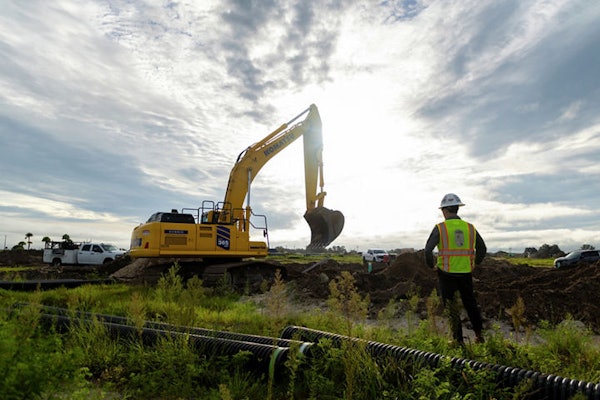Now that the dust has settled from the presidential election, what can contractors expect going forward for the construction economy under the Trump administration?
To answer that question and more, Ken Simonson, chief economist for the Associated General Contractors, gives us an overview of what to expect, what to look for and where there may be some opportunities, on this episode of The Dirt.
Simonson reports that contractors are showing a combination of more optimism yet more uncertainty from the Trump election victory.
Key areas of optimism include regulations and taxes, while concerns over the effects of higher tariffs and tougher immigration policy loom in the distance.
So, check out the latest episode of The Dirt where Simonson gives us an insightful look at what could be in store for construction – including infrastructure, material prices and labor – and what contractors should keep in mind as we undergo the presidential transition and should expect in 2025.
Equipment World serves up weekly videos on the latest in construction equipment, work trucks and pickup trucks – everything contractors need to get their work done. Subscribe and visit us at equipmentworld.com!
In This Episode:
- 00:00 – Economic Impacts of the 2024 Election
- 00:40 – Short and Long-Term Impacts
- 02:33 – The Impact of Tariffs on Construction
- 04:45 – Trump’s Honeymoon Period
- 08:36 – Advice for Contractors
- 11:04 – Final Thoughts
00:00:00:10 - 00:00:28:01
Bryan Furnace
Today we're here to talk about the election. We are officially past this year's election, and whether you're celebrating or reacting in a negative way, it doesn't really matter because we have a bigger question to ask right now. What impact is this going to have on the economy, not just in the immediate now, but over the next six months to a year?
00:00:28:01 - 00:00:39:11
Bryan Furnace
What can we expect? As always, we have our favorite economist on the line, Ken Simonson, is here to give us an update.
00:00:39:12 - 00:00:58:11
Bryan Furnace
Ken, after the election, what can we expect coming down the pipeline, not only in kind of, you know, right now, I think we're seeing a very immediate response to the results of the election, but there's going to be a time period where Trump begins to roll out policies that he's got in place. So I guess it's a two part question.
00:00:58:12 - 00:01:05:04
Bryan Furnace
What are we seeing now and then? What are we going to expect as he starts to roll out policies that he's talked about?
00:01:05:06 - 00:01:35:07
Ken Simonson
Well, it's a really mixed picture. I think contractors are happy about the prospect of a more favorable tax climate than they would have had under a Harris administration, and certainly less regulation, at least less new federal regulation. But there's also greater uncertainty. We don't know how long, or how seriously Trump is going to wait until he pushes things like closing the borders and deporting people who are already here.
00:01:35:11 - 00:02:00:01
Ken Simonson
How soon and how steeply tariffs that he would put in place will be. And of course, a lot of uncertainty still, even as to who will control the house and how big a majority that's going to be. So things that depend on legislation like getting tax provisions either renewed or repealed and replaced, that could be at least a 12 month battle and even longer.
00:02:00:03 - 00:02:22:08
Ken Simonson
And then even getting Trump's nominees confirmed and into office, that may take some time. So a lot is still going to be up in the air for quite a while. I think the two things that are most important in terms of what construction firms will be experiencing are what happens on tariffs and what happens with foreign born workers.
00:02:22:08 - 00:02:32:12
Ken Simonson
Beyond that. Clearly, tax and regulation is also important, but I don't think we'll make as big a difference in the cost or the difficulty of completing projects.
00:02:32:14 - 00:02:53:04
Bryan Furnace
So as an economist, I do think there is a lot of misinformation out there currently about the way tariffs work and who ultimately will be impacted at a very high level. Can you give us a breakdown of what impacts a tariff would have to a front-line guy? That's that's installing septic systems or doing some carpentry?
00:02:53:06 - 00:03:14:21
Ken Simonson
Yeah. A tariff is a tax. It's a very specific to an item or a class of items, but it has the same impact basically as a sales tax, that the price is going to go up on that item. Now the difference with the sales tax is that anything you buy in that store is going to have that sales tax.
00:03:14:21 - 00:03:40:18
Ken Simonson
When you check out with a tariff, it depends if it's foreign made or domestic made as to whether the money is going into the US Treasury or it's going to rest on the table or going to the pocket of the domestic manufacturer. But what we saw when Trump put on steel and aluminum and other tariffs in 2019 is that domestic producers did raise their prices pretty much in tandem with the amount of the tariff increase.
00:03:40:20 - 00:04:04:00
Ken Simonson
And I think that's likely to happen again. It's not guaranteed. But to the extent that domestic producers think that they will be able to make more money by raising their prices, you're going to be paying more for whatever you're buying, whether it's foreign made or domestically made. I think that tariffs are not inflationary in the technical sense, that they don't lead to a spiral of ever-increasing prices.
00:04:04:02 - 00:04:29:02
Ken Simonson
Just as a one-time sales tax increase, affects prices one time, but they don't keep going up. But the danger with a tariff is, first that foreign countries are going to retaliate. And that will hurt U.S. exporting businesses. And also likely lead to a reduction in economic output. And exporters may have to close factories or certainly cancel expansion that they may have planned.
00:04:29:03 - 00:04:37:06
Ken Simonson
So that's a way that contractors would be hurt, as well as having to pay at least one time more for goods that are brought into the country.
00:04:37:12 - 00:04:56:22
Bryan Furnace
Yeah. Thank you for that explanation. That that helps a lot in the understanding of just how that actually affects the front line. My next question is we're kind of in this honeymoon period. I think, you know, we're seeing a lot of really good things happen with the stock market. And there's a lot of up and positivity. How long do you think we're going to kind of have this honeymoon period?
00:04:56:22 - 00:05:07:12
Bryan Furnace
And then what does it look like on the back side of that honeymoon period? But before we get into that, I want to take a second to tell you about the sponsor of this video, Chevron Lubricants.
00:05:07:14 - 00:05:32:09
Shawn Frasier
These cranes work around the clock for months at a time. If one of these engines ever goes down, it cost more than our reputation. Switching to Delos 680 off has been a game changer. We've had no issues with cloud NFS. I mean, no region lights, no cleaning, no replacements, nothing. This all goes beyond anything we've ever used. I choose proven protection that keeps our cranes on the job.
00:05:32:11 - 00:05:36:17
Shawn Frasier
I choose Delos 600 ads.
00:05:36:19 - 00:05:43:16
Bryan Furnace
How long do you think we're going to kind of have this honeymoon period? And then what does it look like on the backside of that honeymoon period?
00:05:43:18 - 00:06:26:16
Ken Simonson
Well, I think it's the norm that as soon as an election is over, whichever candidate has won the presidency, the stock market reacts favorably because investors hate uncertainty and uncertainty about who's going to be the next president is a big category of that. So having this settled the day after the election, rather than waiting 35 days as we did in Bushwick or or having Trump denying the outcome, as we saw four years ago, those things mean that the stock market is more positive now, but the market is looking ahead at what are the prospects for a given company and then more broadly or publicly traded companies.
00:06:26:16 - 00:06:54:08
Ken Simonson
So the stock market is not the same as the overall economy, particularly industries like construction, where most firms are privately held. But nevertheless, it does give you some kind of signal that economic growth is likely to continue in the coming year. But I would not say that this honeymoon will last either, that the stock market makes a judgment every day as to where a company's prospects for profitability are, and, more broadly, the economy.
00:06:54:09 - 00:07:21:08
Ken Simonson
So another thing that is certainly worth keeping an eye on is, what the fed, and collectively, the 19 members of the Federal Open Market Committee think, is going to happen with the economy and what they should be doing about setting that short term interest rate target. So part of the positivity that we saw last week, I think, came from the feds continuing the course for now and reducing that short term rate target.
00:07:21:10 - 00:07:43:00
Ken Simonson
But at the same time, they signaled that we shouldn't take them for granted, that they'll keep doing that. And indeed, some of the fed watchers, then peeled back the amount of reduction that they're expecting from the fed over the next year. Now, short term rates are one thing. They're very important for developers who have to go to a bank or another lender.
00:07:43:02 - 00:08:13:09
Ken Simonson
Long term interest rates have not reacted as favorably. In fact, they edged upward somewhat after the election. And that's because while the market expects strong economic activity, more favorable tax and regulatory policy, they also think the deficit might be even bigger than it would have been under a Harris administration. Or perhaps more mixed the congressional leadership to the extent that interest rates, long term interest rates for Treasury notes and bonds stay higher.
00:08:13:14 - 00:08:36:04
Ken Simonson
That's a negative for home builders, because fewer people will be able to afford monthly mortgage payment. And it's also a negative for municipal bond issuers like school districts and other public agencies. So very definitely, a mixed feelings or a mixed signals coming out of the stock and bond markets.
00:08:36:06 - 00:08:50:18
Bryan Furnace
So any as a final comment, any kind of nuggets or wisdom or advice you'd like to share to contractors for this kind of next six month period as we start to transition from the Biden administration over to the Trump administration.
00:08:50:20 - 00:09:19:21
Ken Simonson
It's sure time to keep a close eye on what is actually happening from Washington, not just listen to what the president says, let alone the echo chamber that has sprung up in terms of social media, podcasts and some of the news so-called news networks. But, to see what, he and his cabinet, his, regulatory appointees, what the courts and, Congress actually do.
00:09:19:21 - 00:09:49:22
Ken Simonson
Because certainly when Trump took office the first time, I think expectations were high, that here's a guy who understands construction. It was talking constantly on infrastructure. And indeed, he continued to talk throughout his term and pronounced lots of infrastructure weeks. And we got zero. Whereas when Biden took office ten months later in mid November of 2021, the biggest infrastructure bill ever, and I think that's largely likely to stay in place.
00:09:50:02 - 00:10:01:17
Ken Simonson
But we'll have to see if Trump tries to peel back some of the infrastructure spending and some of the other things and, how quickly the regulatory environment actually loosens up.
00:10:01:19 - 00:10:08:08
Bryan Furnace
So it sounds like just kind of overall advice. Play conservative for a bit. Let's see what happens after the dust settles.
00:10:08:10 - 00:10:37:05
Ken Simonson
Yeah, I think there really is more uncertainty than there was before the election, even though there's also more optimism among contractors about having a favorable climate in DC. But translating that climate into actual money to spend on construction is a different story. As we saw with the Infrastructure Investment and Jobs Act that yes, it did put $1.2 trillion toward infrastructure, but that money has been really slow coming out.
00:10:37:07 - 00:10:57:18
Ken Simonson
Nevertheless, I do think 2025 will be a good year for infrastructure. Continue to be a good year for renewable energy, and certainly for data centers and for some kinds of manufacturing. And that should outweigh like these continued slowdowns in office and retail and warehouse construction.
00:10:57:20 - 00:11:02:09
Bryan Furnace
Great. Well, Ken, as always, thank you. This has been super insightful, I appreciate it.
00:11:02:11 - 00:11:04:06
Ken Simonson
You're welcome. Brian, glad to be with you.
00:11:04:12 - 00:11:15:00
Bryan Furnace
Well, thank you again for Ken coming on the show to give us an idea of what to expect as the Trump administration begins to take back over. As always, I hope this helps you and your company. We'll catch you on the next episode of The Dirt.









